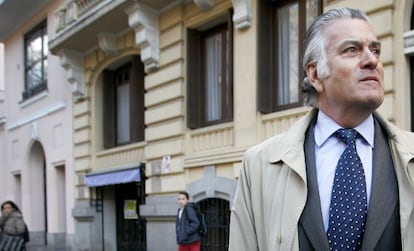Bárcenas sworn statement reveals ex-PP moneyman kept slush fund record
Former party treasurer told a notary that he had noted donations and bonus payments over 15-year period

Luis Bárcenas, the former Popular Party (PP) treasurer under criminal investigation, filed a sworn statement back in December acknowledging that he had kept records of extra payments given to top party officials as well as contributions made by businessmen to the conservative grouping for 15 years, court records show.
A report prepared by the police’s UDEF financial and economic crimes squad, part of the massive case file attached to the Gürtel corruption inquiry, states that Bárcenas took out the sworn statement on December 14. In his declaration, the embattled former senator stated that he and his predecessor as PP treasurer, Álvaro Lapuerta, kept an “analytical account” of the payments and donations between 1994 and 2009.
The statement was taken before notary Andrés Domínguez Nafría on the same day that a rogatory commission sent to Switzerland discovered that Bárcenas had 22 million euros in Swiss accounts. It wasn’t clear if the former PP treasurer knew of the commission’s discovery; it was not until a month later that news of the accounts hit the Spanish press.
It was my responsibility to control PP revenues and expenditures from 1994 to 2009"
In his sworn statement, Bárcenas said: “That it was my responsibility along with Don Álvaro Lapuerta Quintero to control the revenues and expenditures under the Popular Party Donations heading from the years 1994 to 2009. I also hereby state that the analytical account exclusively reflects the money taken in through the concept of donations and its corresponding application in the concept of expenditures…”
Bárcenas explains that “supporting documents” filed with the statement “reflect with detail the names of the contributors and the receivers of these funds.”
Bárcenas’ statement coincides with the balance sheets obtained and published by EL PAÍS on January 31 showing that about a dozen top PP officials, including Prime Minister Mariano Rajoy and party secretary general María Dolores de Cospedal, were receiving bonuses from a slush fund. All of the officials whose names appear on the balance sheets, handwritten by Bárcenas, denied that they had received any money.
Bárcenas’ statement coincides with the balance sheets published by EL PAÍS on January 31
In an audio interview with 13TV station, Bárcenas said that the handwriting that appears in the ledgers is not his, even though noted graphology experts agree that they were made by the former treasurer over a period of time.
Bárcenas’ ledgers, which register dozens of donations by companies and businessmen, reflect that money was being given to the PP in quantities which violated the Party Financing Law. All of the businessmen and companies whose names appear in the ledgers also denied that they contributed those amounts to the PP.
Some PP members have speculated that the fortune amassed by Bárcenas throughout the years may have resulted from his diverting part of those contributions.
Also on Thursday, Reuters, quoting other High Court case filings, reported that in 2005 Bárcenas had told the Swiss Dresdner Bank, since acquired by LGT bank, that the funds came from his involvement with eight Spanish and Argentinean companies and from real estate and fine art deals. The companies were television producer Serena Digital; water treatment firm Langa de Duero Enercorr XXI; Netcheck consulting firm; a financial business now run by Bankia; Producciones Altea Films; Padel Set; La Moraleja, an Argentinean citrus and soy producer owned by the family of Ángel Sanchís, another former PP treasurer; and Acesa and Accion Editorial SA.
Tu suscripción se está usando en otro dispositivo
¿Quieres añadir otro usuario a tu suscripción?
Si continúas leyendo en este dispositivo, no se podrá leer en el otro.
FlechaTu suscripción se está usando en otro dispositivo y solo puedes acceder a EL PAÍS desde un dispositivo a la vez.
Si quieres compartir tu cuenta, cambia tu suscripción a la modalidad Premium, así podrás añadir otro usuario. Cada uno accederá con su propia cuenta de email, lo que os permitirá personalizar vuestra experiencia en EL PAÍS.
¿Tienes una suscripción de empresa? Accede aquí para contratar más cuentas.
En el caso de no saber quién está usando tu cuenta, te recomendamos cambiar tu contraseña aquí.
Si decides continuar compartiendo tu cuenta, este mensaje se mostrará en tu dispositivo y en el de la otra persona que está usando tu cuenta de forma indefinida, afectando a tu experiencia de lectura. Puedes consultar aquí los términos y condiciones de la suscripción digital.








































